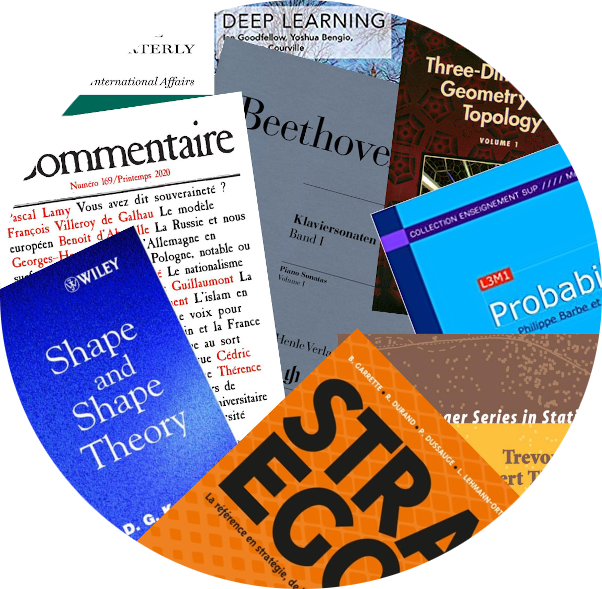 Philippe Barbe
Philippe Barbe

|
“Pick a technical topic that you know really well, and tell me about it!”by Philippe Barbe
29 Sep 2021
|
The title of this article, pick a technical topic that you know really well, and tell me about it, is my request to every Data Science candidate I interview. Why I will make that request is explained in my previous article.
I am more than happy to share this information very publicly. I prefer that candidates applying for a role on my team know that they will face this request.
Before moving to apply my knowledge of Data Science to the business world in 2014, I had a lengthy career in academia. When hiring a professor, it would never occur to any colleague to ask the candidate a question on a topic that they were not familiar with. All the questions are about the candidate’s work based on publications and some form of track record (even for someone who just graduated) because that’s what we are hiring them for … their knowledge.
In business, I am seeking to gauge how well you can understand something. Hence, I want you at your best for this is as good as you can be.
Many candidates are surprised by my request. What should be an easy question becomes an open landscape of their own knowledge where they often get lost. They want to optimize, balance what they know with what they think I want them to know, or perhaps what they think I want to get to, or sometimes what they think will impress me.
Ironically, while I am trying to bring them to their most comfortable spot, they often start with hesitation, and often with the wrong topic!
As the candidate proceeds to tell me about the topic they have chosen I will ask questions based on my knowledge, or lack thereof, of that topic
One candidate chose to tell me about the work he was currently doing and referenced a paper multiple times explaining how foundational this paper was, and how central it was to what he was doing. Intrigued, I suggested that we read the paper together, downloaded it on the spot, and reviewed it quickly. The paper had a couple of theorems, I picked one and asked for an explanation.
The candidate could not explain it.
If you do not understand what you claim to be foundational to what you do, what will you understand about what’s foundational to the work the company will ask you to do?
A PhD who had recently completed her thesis was surprised that I spotted a mistake in a proof in her thesis. Not many managers bother to read proofs. Mistakes do happen. This was not a benign one like a typo. One on her arguments was not correct. I thought it was fixable with some work so we started to discuss it. The candidate was obviously annoyed and at first did not quite understand the problem. A good sign! She will not say “yes” all the time just because I lead the team, she will push back when needed.
Once convinced that there was indeed a problem she acknowledged it, asked me an opinion, and since it was probably fixable we started to discuss the matter. We proceeded to have an intricate discussion which, although it did not fix the mistake, proved to me that she knew the topic very well.
Another candidate picked a topic that I knew, but not very well. I decided that given my knowledge and what I was seeking to learn from the candidate, the best course was to pretend I knew nothing, and I told the candidate about that assumption. We started with the basics but when we went deeper and I asked more questions the answers became more and more vague. And finally the candidate acknowledged that he did not know the topic that well!
That happens and I am used to it. The candidate wants to impress, picks a difficult topic which he or she hasn’t mastered. That is understandable. No harm. After that, if hired, that candidate will not try to impress me by throwing some jargon. Good!
I tell the candidate that they don’t know the topic that well, reset expectations and ask again for something that they actually know really well. I am not looking for something fancy. I am looking for depth. Often, this second topic is the good one.
Interestingly, some candidates, regardless how senior they are, pick their PhD thesis. This is fine. I often read it! So be it if this is what they know the best. But, their choice says something unsettling about the companies that they worked for if, after 20 years of working, they haven’t had a chance to learn something new as well as they know their thesis topic.
If I know the topic pretty well then it is a dialogue. I usually tend to go toward what I do not know. I want to learn something. I also want you to know that you may end up in a team where it is fine not to know something, where if you do not know, you are expected to ask questions. You will also know about my own limitations, which is useful information if we are going to work together. But more to the point, how well you know your topic will be reflected by how well you can communicate it.
If the candidate chooses a topic that I know really well, they are in for detailed and difficult questions! We’ll see if their expertise matches mine. Part of the questioning is intellectual fun. There is still a bit of academic behavior in me, and most professors tend to ask difficult questions to knowledgeable colleagues which makes the discussion more interesting. If we both know the topic really well, we can dive into the most intricate parts which means finding things that one or the other of us doesn’t know. If this happens then it is no longer about interviewing, it’s about learning from each other. Box checked!
If you pick a topic that I do not know at all, then you are an exceptional person! I have a very large personal library, and so far I have not encountered a candidate picking a topic that I do not know at all. But as I indicated, there are topics that I know less than others, and the same would apply to a topic that I do not know at all: can you explain it? Can you teach it? Does what you are saying make sense? How are you going to formulate your explanation given that you are speaking with someone who can be highly technical?
An interview is a dialogue. I am seeking individuals who can think creatively alongside their technical skills so that we can have very frank technical discussions.
How well we can explain something is a good indicator of how well we know that something. How well we can communicate what we know about a technical topic is a measure of how well we understand it. How simple the subject seems to us is a measure of how much and how deeply we have thought about it.
Asking candidates to pick whatever topic they know best and talk about it has so far been the most revealing part of my interviews with candidates and has provided me fair answers to the central question of how well these candidates will perform on the job in the long term. The reason is simple: to solve business problems, you have to understand them really well and you have to understand well all the tools that you are going to use or not use. That understanding is what will make you creative while remaining in the bounds of reason.
I have found that by giving the candidate the opportunity to choose the topic and showcase their expertise in their area of strength I learn more about them and get the more useful information to help me determine if we should partner.